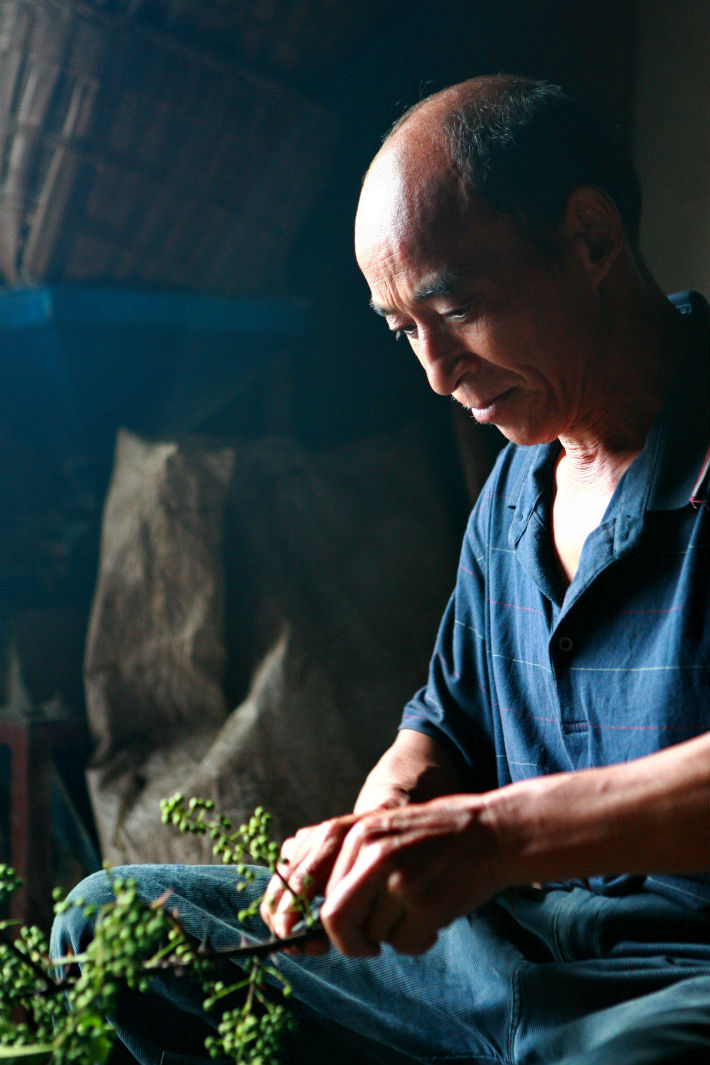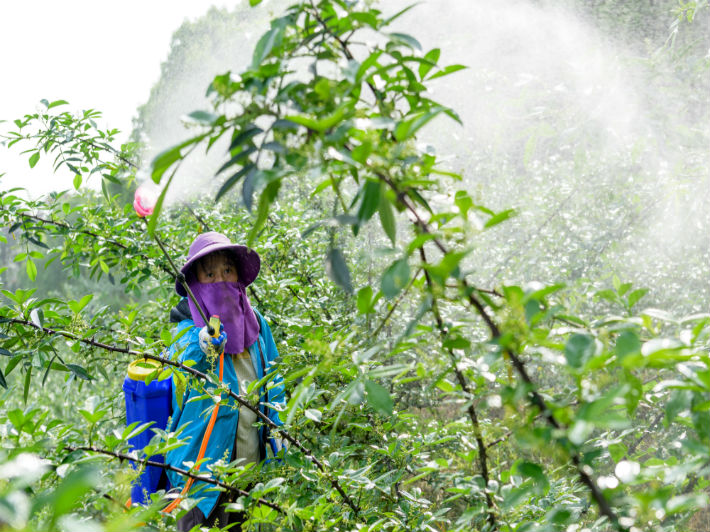The Power of Sichuan Peppers

Thanks to its distinctive mouth-numbing, spicy flavor, Sichuan cuisine is popular with hundreds of millions of people both in China and around the world. At the heart of Sichuan cuisine is the Sichuan pepper, a spice derived from several species of the genus Zanthoxylum. This most commonly used spice in Chinese cuisine creates a tingly numbness in the mouth. Every midsummer, this magical spice ripens for harvest.
In mid-June of this year, plump green peppercorns abounded on densely planted Sichuan pepper trees on the slopes near the southern bank of the Yangtze River in Zhanpu Town, Fengdu County, Chongqing Municipality. The “green pearls,” with unique aroma and flavor, have helped local farmers rise from poverty while bonding officials and residents more closely.
Zhang’s New Day
Zhang Jisheng, 53, resides in Baishui Community, Zhanpu Town, where he was the sole provider for the other three members of his family: his wife who couldn’t work due to illness, his grade school-aged son and his 90-year-old mother. The whole family survived on a meager annual income of 2,000 to 3,000 yuan (US$290 to 435) that Zhang Jisheng earned from growing corn.

Zhang Jisheng cuts and picks Sichuan peppers at home. The government’s poverty reduction measures have helped Zhang and his family regain the confidence and courage for a new life. by Yu Jie
“In those days, we could only afford to eat rice and corn and dared not imagine eating meat,” Zhang Jisheng recalled. “I often ate smaller portions so everyone else could have more.” Even though the situation was bad, stubborn Zhang Jisheng didn’t ask for help from the government or his relatives. The year 2015 was particularly bad for him. His mother died, and his son fell ill. One blow after another shattered Zhang Jisheng, pushing him to the verge of collapse. “I felt completely hopeless,” he admitted.
As Zhang Jisheng was at the end of his rope, Zhang Yuqun, who is responsible for poverty alleviation work in Baishui Community, arrived at his door. The 48-year-old Zhang Yuqun is an official with the government of Zhanpu Town. When China launched its nationwide targeted poverty alleviation campaign in 2014, she was appointed head of the poverty relief team for Baishui Community. Alongside four team members, she spent one year visiting all the 900-plus households in the community to learn about the living conditions of each family and compile files on the poor. During such visits, she discovered Zhang Jisheng’s plight. “I was shocked when I arrived at the home of Zhang Jisheng and learned of his situation,” Zhang Yuqun gasped. “The house was quite bare. Moreover, it was dilapidated and in dire need of repairs. The roof leaked badly during rain. And some members in his family were ill. His household was the poorest in the community.” Zhang Yuqun immediately reported this situation to Ran Hailong, Party chief of Baishui Community. They decided to help Zhang Jisheng overcome his difficulties as soon as possible.
Soon, Ran applied for a subsistence allowance for Zhang Jisheng’s family, which provided them a subsidy of 180 yuan (US$26) per month. Although it was a relatively small sum, it was still a big help for the family.
In early 2016, thanks to Ran’s efforts, a new house was built for Zhang Jisheng in the community in just one month. Zhang Yuqun and other village officials bought furniture and daily necessities and helped Zhang Jisheng’s family move into the new home. On moving day, Zhang Jisheng was greatly moved and became quite emotional.
With poverty alleviation officials’ help, Zhang Jisheng soon planted 0.1 hectare of Sichuan peppers with high economic potential and applied for disability benefits of 200 yuan (US$29) per person per month for his wife and son. Ran also helped Zhang Jisheng land a job cleaning village streets for a monthly income of 1,700 yuan (US$247). Along with a rise in the subsistence allowance to 350 yuan (US$51) per person per month, his family’s annual income in 2018 exceeded 38,000 yuan (US$5,517), a tenfold increase over a few years ago.
In January 2019, with the help of Zhang Yuqun and others, Zhang Jisheng was granted a loan of 30,000 yuan (US$4,356) to start his own Sichuan pepper field. “Starting in 2015, the government of Fengdu County worked with several banks to provide microcredit with subsidized interest for poverty-stricken households in the county, which aimed to help them develop industry. Over the past four years, Zhanpu Town has issued loans totaling 6.06 million yuan (US$880,000). Poverty-stricken residents who receive the loans only need to repay the principal,” explained 39-year-old Xiang Hailin, head of Zhanpu Town. “The interest is covered by the government and banks. Officials responsible for poverty alleviation work also need to teach the poor how to apply for a loan and give them advice on using the loan reasonably.”
Zhang Jisheng used his loan to buy fertilizer and pesticide and hire help. His Sichuan pepper planting business gradually took shape. He became determined to pay off the loan by the end of this year so the government doesn’t have to shoulder too much interest.
Wealth of a Village
“In 2014, Zhanpu designated Sichuan pepper cultivation as a poverty alleviation industry and by 2015, large-scale plantation had begun,” recounted Xiang Hailin. “Today, the town manages a total of more than 740 hectares of Sichuan pepper fields that produced an output value of more than 70 million yuan (US$10.16 million) in 2018. The pepper industry has helped lift 155 of 261 poverty-stricken households in the town out of poverty. Practice has demonstrated that planting Sichuan peppers aligns with the green development concept that ‘clear waters and lush mountains are invaluable assets.’ It protects the environment of the Three Gorges Reservoir area and helps locals shake off poverty.”
Today, 71 people in 36 families still live in poverty in Zhanpu. Most are unable to work because of disability or illness. Xiang believes that they will overcome poverty through the subsistence allowance as a basic guarantee. “We are confident that we will meet our goal of lifting all the poor in Zhanpu out of poverty by 2020,” he declared.

To date, the pepper industry has helped lift 155 of 261 poverty-stricken households in Zhanpu Town out of poverty. courtesy of Fengdu County Publicity Department
Xiang also revealed that some locals worried that policies benefiting farmers would end if all the poverty alleviation goals were met. He assured them that China’s central government has promised that good policies would remain in effect even after poverty alleviation goals are achieved to ensure policies continue benefiting farmers. Moreover, after the completion of poverty alleviation tasks, China’s rural revitalization strategy will continue to boost rural development to a higher level.
Xiang has more long-term plans along with completing poverty reduction tasks on time. Shortly after taking his post as head of Zhanpu Town, he proposed creating a beautiful Zhanpu with clean and beautiful houses, neatly arranged facilities, courtyards with flowers and plants and civilized residents. In May 2019, the town government provided 10 complimentary Chinese rose saplings for each rural family, encouraging people to plant the flowers in waste containers placed at random or to decorate their courtyards. Xiang called this campaign “turning waste into treasure by planting flowers and grass.”
“We encouraged this because we hoped to inspire more people to commit to improving the environment and keeping it neat,” Xiang said. “Farmers must emerge from poverty in both economic and spiritual terms. Creating a beautiful living environment will inspire the drive to shake off poverty and inject them with new hope.”
Although local officials admit that their accomplishments are far from earth-shaking, such “petty things” are accumulating into major changes in Zhanpu Town.